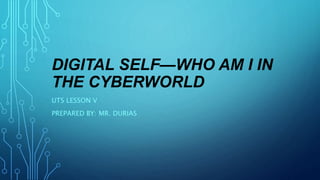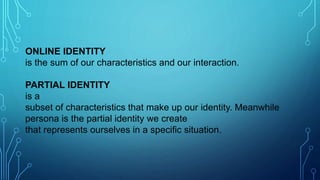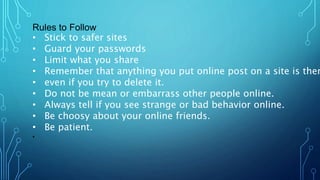- 1. DIGITAL SELF—WHO AM I IN
THE CYBERWORLD
UTS LESSON V
PREPARED BY: MR. DURIAS
- 2. DIGITAL SELF—WHO AM I IN THE CYBERWORLD
Learning Outcomes:
1. Define online identity;
2. Compare real identity versus online identity;
3. Describe the influence of Internet on sexuality and gender;
4. Discuss the proper way of demonstrating our values and
attitude online.
- 3. ONLINE IDENTITY
is the sum of our characteristics and our interaction.
PARTIAL IDENTITY
is a
subset of characteristics that make up our identity. Meanwhile
persona is the partial identity we create
that represents ourselves in a specific situation.
- 4. Selective Self-Presentation and Impression Management
According to Goffman (1959) and Leary (1995), self-presentation is
the "Process of Controlling
how one is Perceived by other people" and is the key to relationship
inception and development. To
construct positive images, individuals selectively provide
information about them and carefully cater this
information in response to other's feedback.
- 5. Anything posted online should be considered
"Public" no matter what our "Privacy" setting are.
PERSONAL IDENTITY is the interpersonal level of
self which differentiates the individual as unique from
others. SOCIAL IDENTITY is the level of self
whereby the individual is identified by his or her
group
membership.
- 6. BELK (2013) explained that sharing ourselves is no longer
new and has been practiced as soon
as human being formed. Digital devices help us share
information broadly, now than ever before. In older
Family albums, the photographer was not often represented
in the album (Mendelson and Papacharissi
2011), whereas with arm’s length photos, they are
necessarily included.
- 7. As Schwarz (2012) mentioned, we have entered an
extraordinary era of self-portraiture. Blogs
and web pages have been continually used for greater
self-reflection and self-presentation Facebook and
other social media application are now a key part of self-
presentation for one sixth of humanity. As a
result, researchers, and participants become concerned
with activity managing identity and reputation
and to warn against the phenomenon of "over sharing".
- 8. (Gershon 2010) Many teenagers, as well as adults,
share even more intimate details with their partners like their
passwords
This could be an ultimate act of intimacy
and trust or the ultimate expression
of paranoia and distrust with partners.
- 9. (Ridley 2012: Suler 2004.) People would
like to remain updated, and they keep on sharing
themselves online because it adds a sense of
confidence at their end especially if others like and share their p
One of the reasons for so much
sharing and self-disclosure online is the so called "Disinhibition
- 10. Taylor 2002
The lack
of face-to-face gaze-meeting, together with feelings
of anonymity and invisibility,
gives people the
freedom for self-disclosure but can also “flame” others and
may cause conflict sometimes.
The resulting
disinhibition causes people to believe that they
can express their “true self” better online than they ever
could in face-to-face context.
- 11. However, it does not mean that there
is a fixed “true self.” The self is still a
work in progress, and
we keep on improving and
developing ourselves every single
day.
- 12. Gender and Sexuality Online
According to Marwick (2013), the term “sex”, “gender” and “sex
are often thought of as
synonymous, they are actually quite distinct.
The differences b/w the common understandings of these
terms and how researchers think about them yield insights
about the social functioning of gender.
- 13. (West and
Zimmerman 1987).
SEX is the biological state that corresponds to what
we might call a “man” or a “woman”. While
“sex” is often explained as biological, fixed, and
immutable, it is actually socially constructed
- 14. (Kessler and Mc Kenna 1978,
Lorber 1994)
Gender- is the social understanding of how sex should
be experienced and how sex
manifests in behavior, personality, preferences,
capabilities and so forth. A person with male sex
organs
is expected to embody a muscular gender.
- 15. While sex and gender are presumed to be biologically
connected, we can understand a socio
culturally specific set of norms that are mapped onto a
category of “sex”
Sexuality is an individual expression and
understanding of desire. While like gender, this is
often
viewed as binary (homosexual or heterosexual), in
reality, sexuality is often experienced as fluid.
- 16. Performing Gender Online
Theorist Judith Butler (1990) conceptualized
gender as a performance. She argued that gender
was performative in that it is produced through
millions of individual actions rather than
something that
comes naturally to men and women.
- 17. WYNN and KATZ 1997
According to the disembodiment hypothesis, Internet users
are free to actively choose which
gender or sexuality they are going to portray with the
possibility of creating alternate identities.
- 18. Setting Boundaries to your Online Self:
Smart Sharing
ff. guidelines will help you share information online in a smart way that will protect yourself
and not harm others. Before posting or sharing anything online, consider the ff.
- 19. Smart Sharing
ff. guidelines will help you share information online in a smart
way that will protect yourself
and not harm others. Before posting or sharing anything online,
consider the ff.
1. Is this post / story necessary
- 20. 2. Is there a real benefit to this post? Is it funny,
warm- hearted, teachable-or am I just making
noise
online without purpose?
3. Have we (as a family or parent/ child)
resolved this issue? An issue that is still being
worked out at
home, or one that is either vulnerable or highly
emotional, should not be made public.
- 21. 4. Is it appropriate? Does it stay within the boundaries of our
family values?
5. Will this seem as funny in 5, 10, 15 yrs.? Or is this post
better suited for sharing with a small group of
family members? Or maybe not at all?
- 22. Rules to Follow
• Stick to safer sites
• Guard your passwords
• Limit what you share
• Remember that anything you put online post on a site is ther
• even if you try to delete it.
• Do not be mean or embarrass other people online.
• Always tell if you see strange or bad behavior online.
• Be choosy about your online friends.
• Be patient.
•
- 23. THANK YOU….
ACHIEVE YOUR GOALS IN SILENCE…..






















